Spiders
Spiders are predators and eat a wide variety of nuisance insects, small vertebrates, invertebrates and other spiders. This helps to reduce their numbers. Spiders are not insects but arachnids. They are closely related to mites and ticks. Each spider has eight legs, two body parts and fangs (chelicerae). Pedipalps are also used by spiders to make silk, to line burrows or wrap prey. These strong silk strands are also used by spiders to climb and mark their way to and from the nest.
What Kinds of Spiders Are There?
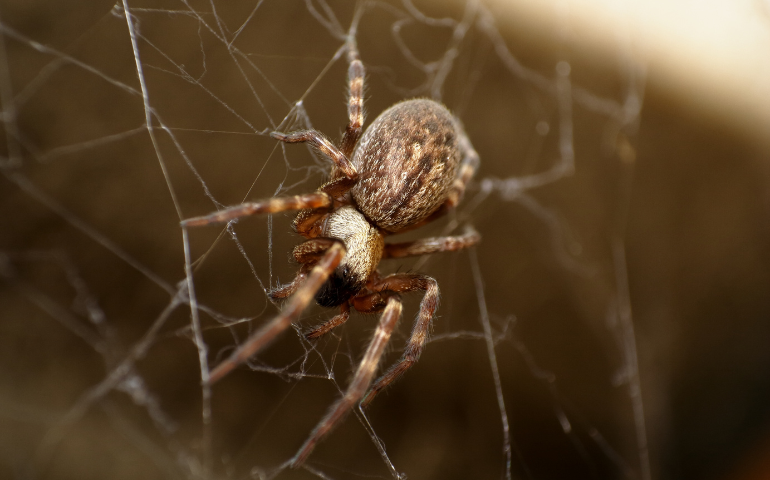
The common house spider is typically light brown or gray with a rounded, bulbous abdomen adorned with darker markings. Adults measure about 1/4 to 1/2 inch in body length, with a leg span reaching up to 1-2 inches. They are known for their messy, irregular webs found in corners of rooms and attics.
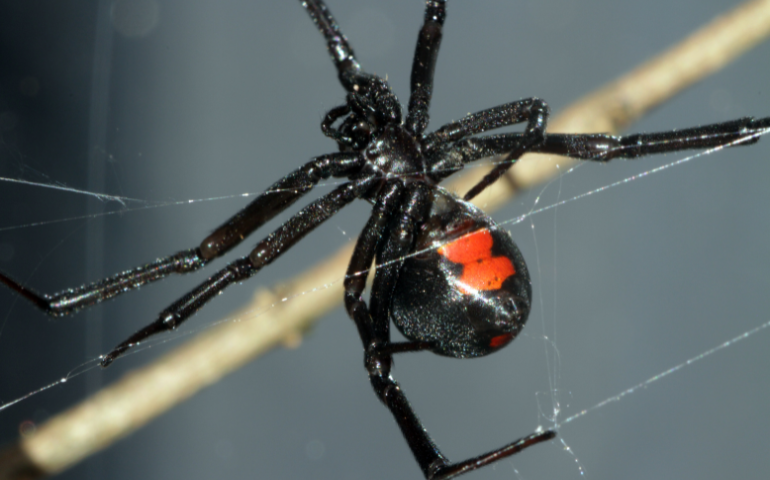
The black widow spider is easily identifiable by its glossy black body and distinctive red hourglass marking on the underside of the abdomen. Females typically measure about 1.5 inches in body length, while males are smaller at around 1/2 to 1 inch. Known for their potent venom, which can cause serious symptoms in humans, black widows often build their webs in sheltered areas, such as woodpiles or under furniture.
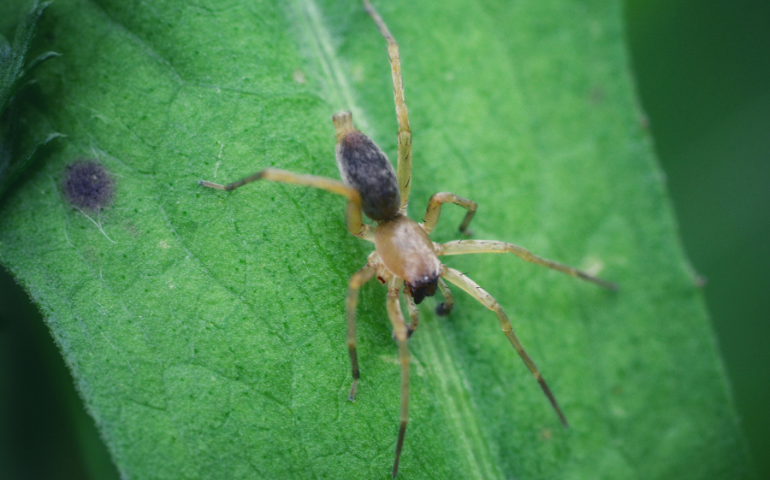
Yellow sac spiders have a pale yellow or light greenish-yellow body, often featuring a darker stripe down the center of their back. Adults measure about 1/4 to 1/2 inch in body length, with long, slender legs. Known for their nocturnal hunting behavior, they create small silk sacs to rest in during the day. While their bites can be painful, they are not usually serious.
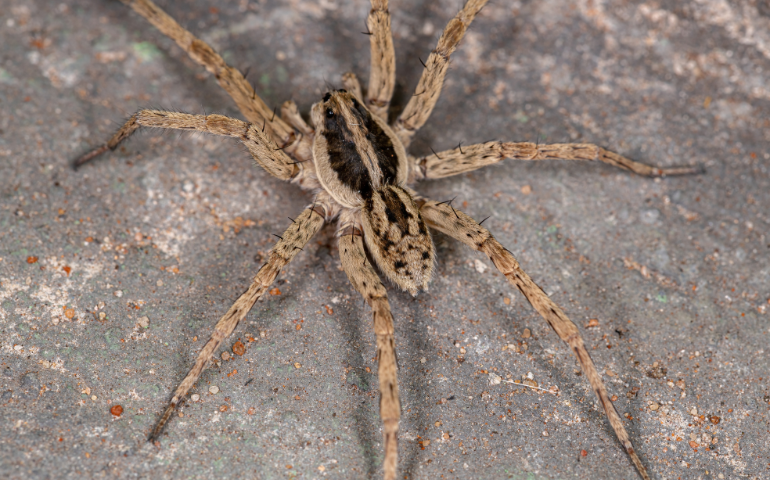
Wolf spiders have a robust and hairy appearance, usually in shades of brown or gray with darker stripes. They range in size from 1/2 inch to over 2 inches in body length, with even larger leg spans. Unlike many spiders, wolf spiders are active hunters that do not spin webs, relying instead on their speed and agility to catch prey. They are often found in gardens, fields, and occasionally indoors.
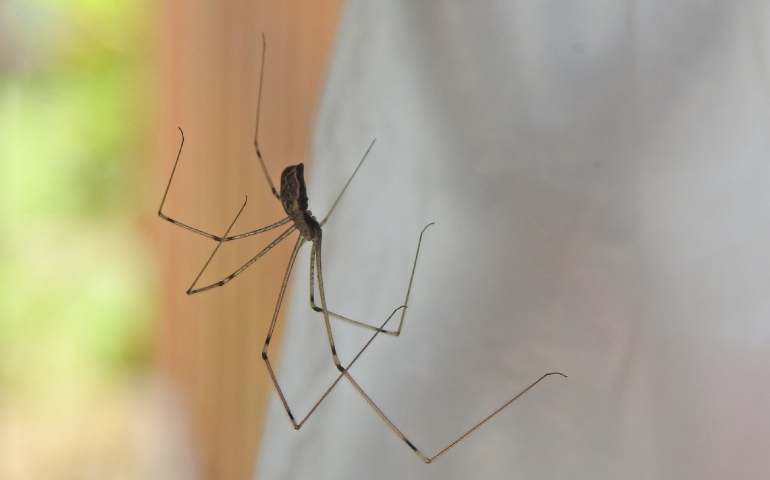
Commonly referred to as "daddy longlegs," cellar spiders have long, thin legs and small, rounded bodies that are pale yellow to light brown. Their body size ranges from 1/4 to 1/2 inch, with leg spans reaching up to 3 inches or more. These spiders build messy webs in dark corners and basements.
These are just a few of the most common examples compared to the vast majority of spider species world wide.
Habitat & Behavior
Some spiders love moisture, so they can be found in crawl spaces, basements and other damp areas of buildings. Some spiders prefer dry, warm places such as attics, subfloor air vents and upper corners of rooms. They prefer dark places.
Thousands of spider species have been discovered around the globe. These arachnids are eight-legged and have two body segments. Three to four pairs of eyes are common for spiders. Although many spiders have poor vision and some species, like the jumping spider, have excellent vision.
Diet
They eat insects, spiders, and other prey.
Spiders don’t have chewing mouthparts, and instead use digestive enzymes in saliva to digest prey before they eat it. A spider’s gut is too small to allow them to eat large food particles. Although most spider species are predators there is one known plant-feeding species.
Reproduction
The egg sac is the mother of spiderlings. The molting process is repeated until spiderlings become adults. Many spider species have males that court females. Male jumping spiders, for example, perform elaborate dances in order to draw the female’s attention. Males may be eaten by the female after mating.
Webs Made of Silk
Spiders can produce silk that is strong, elastic and adhesive. This silk can be used to create webs, egg sacs, and spider dwellings. Spider webs can vary in size and shape depending on the species. Some webs are funnel-shaped while others are orb-shaped. Others are funnel-shaped. While some spider species prefer to live in burrows over webs, others prefer to be free-ranging and seek refuge in crevices.
How To Get Rid of Spiders With Professional Pest Control
Spiders are a common household pest that can cause discomfort and fear for many homeowners. At Alta Pest Control, we offer comprehensive spider control solutions tailored to your needs. Here’s how we can help you get rid of spiders:
1. Thorough Inspection:
Our skilled technicians conduct a detailed inspection of your property to identify spider activity and their entry points. By pinpointing the areas where spiders are most likely to hide and breed, we can develop a targeted treatment plan to eliminate them effectively.
2. Interior and Exterior Treatments:
We employ a combination of interior and exterior treatments to eradicate spiders and prevent their return. Our treatments focus on key areas where spiders are known to frequent, including basements, attics, crawl spaces, and outdoor perimeters. We use safe and effective insecticides and techniques to ensure thorough coverage and long-lasting results.
3. Web Removal and Sanitation:
In addition to chemical treatments, we also offer web removal services to eliminate existing spider webs and egg sacs. By removing webs and debris from your property, we reduce hiding spots and discourage spider activity. We also provide recommendations for sanitation practices to make your home less attractive to spiders.
4. Preventive Measures:
To prevent future spider infestations, we offer guidance on sealing entry points, reducing clutter, and implementing habitat modifications. By addressing factors that attract spiders to your home, we can help minimize the likelihood of future infestations and maintain a spider-free environment.
5. Ongoing Maintenance:
Our services don’t stop once the spiders are gone. We provide ongoing maintenance and monitoring to ensure that your property remains spider-free. With regular inspections and treatments, we can proactively address any emerging spider activity and prevent infestations from reoccurring.
Don’t let spiders take over your home. Trust Alta Pest Control for expert spider control solutions that deliver results. Contact us today to schedule a consultation and take back control of your property from these unwanted pests.
